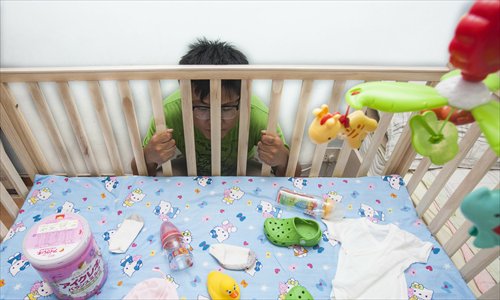HOME >> LIFE, METRO BEIJING
Why are you crying, dad?
By Li Lin Source:Global Times Published: 2014-7-20 18:13:01
Postpartum depression not just a risk for new moms

Having a baby is a life-changing moment for many new dads, but not all adjust to the transformation well. Photo: Li Hao/GT
Postpartum depression is a well-known condition suffered by some new moms after giving birth. Given the psychological and physical strain women endure during pregnancy and childbirth, experiencing emotional turmoil is perhaps unsurprising. New dads, by contrast, are supposed to be pillars of happiness and support during this time. But the reality is postpartum depression affects some men, too.Zhong Lin (pseudonym) has experienced an emotional roller coaster since his daughter was born in May. Like most new dads, the 28-year-old was in a state of euphoria during the first few days after his daughter's birth. But he soon found himself inexplicably sliding into depression.
He couldn't sleep at night and felt tired and depressed during the day. He became uninterested at work and often quarreled with colleagues, but he didn't want to leave the office at the end of the day. Some evenings he refused to go home, playing computer games at work late into the night.
"I knew I should be happy, but I was surprised to find myself becoming increasingly depressed and anxious," said Zhong. "I love my wife and daughter, but at the time I couldn't help but feel the urge to escape them."
Zhong went online to seek answers for his syndrome. To his surprise, he found he wasn't alone. There was a group on online chat service QQ with many men also battling postpartum depression.
Zhong gradually learned his condition was nothing to be ashamed of and his symptoms could be managed.
Cynicism, impulsiveness, indecisiveness, working constantly and loss of sex drive are some of the symptoms of male postpartum depression. It can take hold of new dads two or three weeks after birth, lasting up to a year or longer if untreated.
Around one in 10 new dads experience postpartum depression, according to US nonprofit organization Postpartum Progress. But many men choose to suffer in silence amid concern that speaking about their condition might make them appear weak.
By comparison, around 14 percent of new mothers experience postpartum depression, according to an April 2010 report on Internet portal sohu.com. Pu Zhaohe, an associate research fellow at Chengdu University of Traditional Chinese Medicine quoted in the report, said dads experiencing postpartum depression can pass the condition on to their female partners.
Postpartum depression experienced by one or both parents can also negatively affect newborns' early development. Parents who are depressed are less likely to interact with their babies by reading, telling stories or singing songs.
"Postpartum depression in men is caused by their inability to properly handle sudden changes to their living environment and social and family roles," Han Meiling, a psychologist who has more than 188,000 followers on Sina Weibo, said in an August 2012 post.
Zhong has his own theories about what triggered his own battle with postpartum depression.
"I think financial strain and pressure from my parents were what made me depressed," he said. Zhong's daughter doesn't have a Beijing hukou [household registration], which excludes her from being able to attend a local public school. Zhong also admitted his parents told him they were disappointed to have a girl for their first grandchild, and keeping this a secret from his wife worsened his depression.
Experts advise men to make lifestyle changes, such as practicing better self-care and exercising more, to beat postpartum depression. More severe or prolonged symptoms might require professional help.
Posted in: Family, Intel